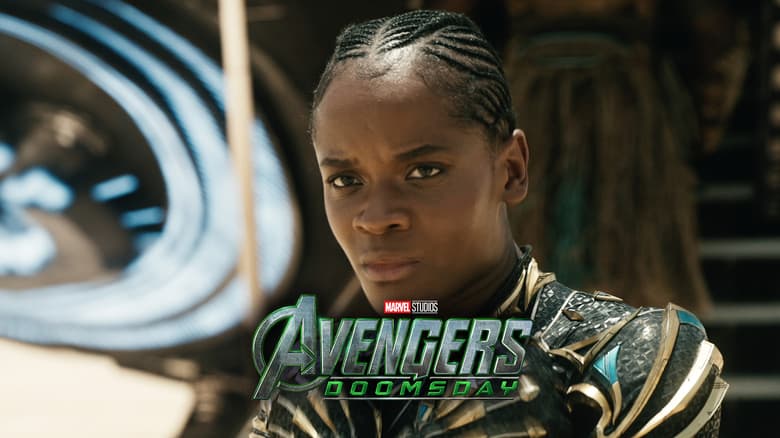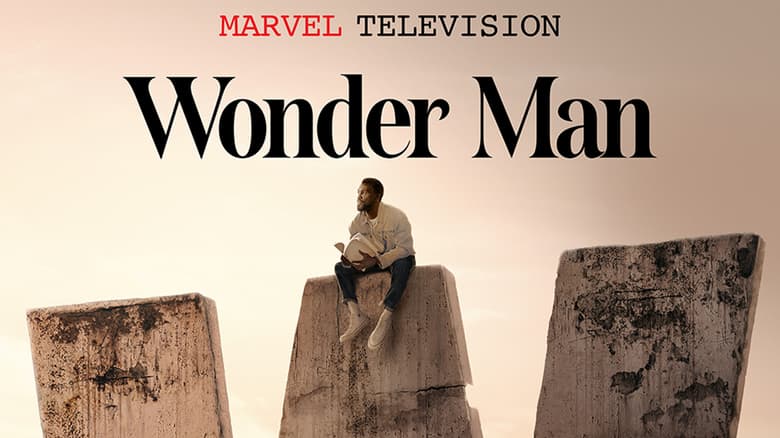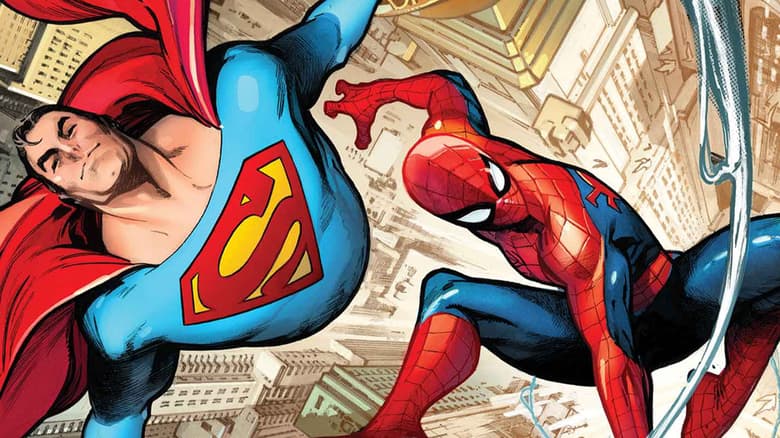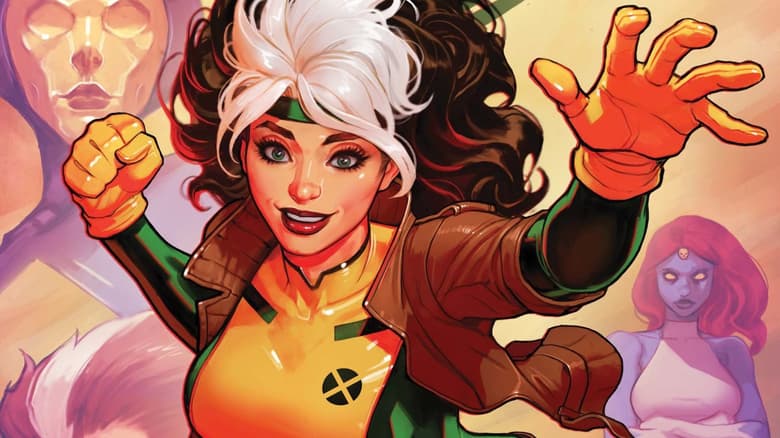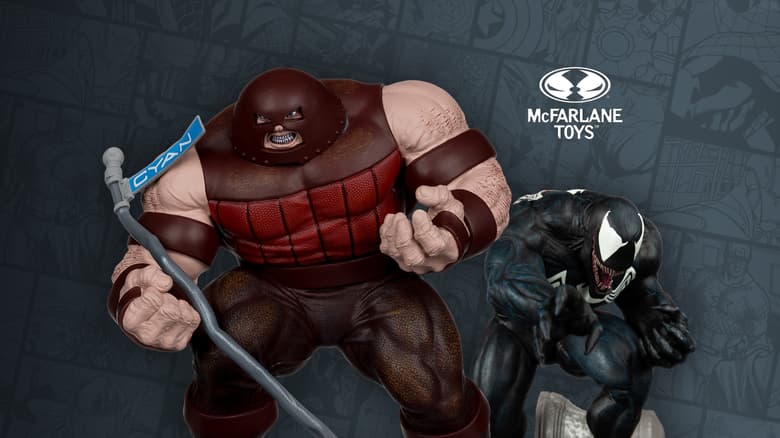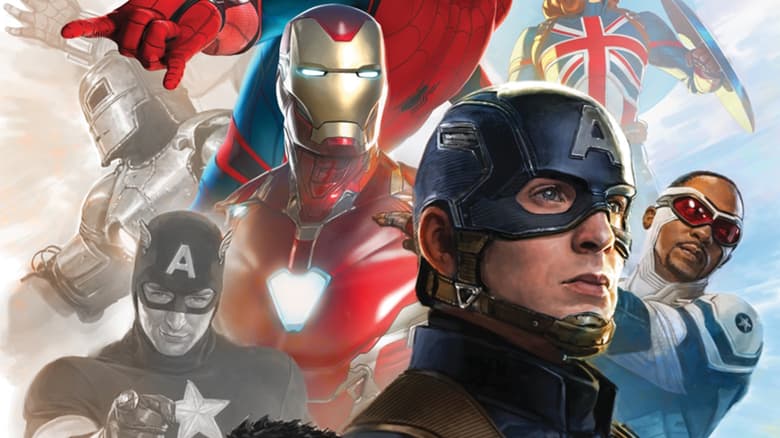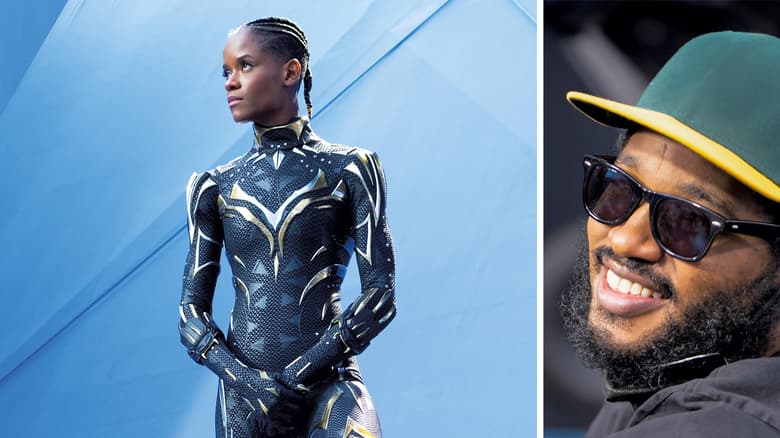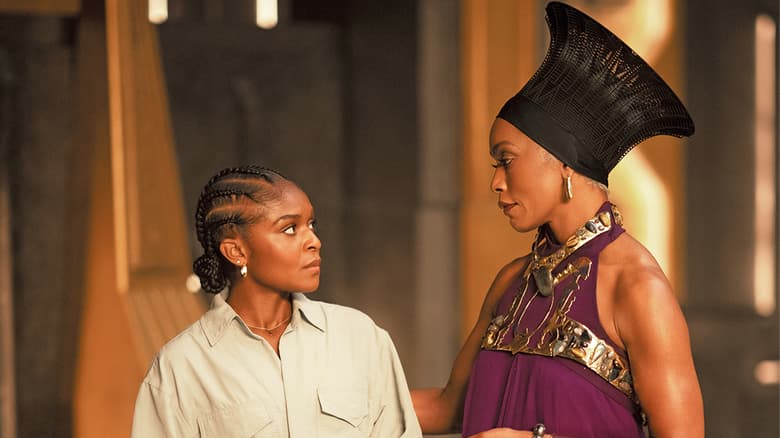'Black Panther: Wakanda Forever' Visual Effects Team Breaks Down Namor's Attack on Wakanda
Craig Hammack, Chris White, Dan Sudick, and Geoff Baumann discuss their contributions to 'Black Panther: Wakanda Forever.'
After introducing an all-new underwater world to the Marvel Cinematic Universe, the visual effects team behind Marvel Studios' Black Panther: Wakanda Forever faced another challenge: bringing a little bit of Talokan to Wakanda. In a climactic scene during the film, Namor attacks the Wakandan throne room, and this particular set piece required a complex, coordinated effort from all across the VFX team.
On a recent episode of This Week in Marvel, Craig Hammack (Industrial Light & Magic Visual Effects Supervisor), Chris White (Weta Effects Visual Effects Supervisor), Dan Sudick (Special Effects Supervisor), and Geoff Baumann (Marvel Studios Visual Effects Supervisor) broke down their approach to Namor's attack on the Wakandan throne room. They also discussed other aspects of their VFX work on Black Panther: Wakanda Forever, including the shocking amount of real water they used during the production.
Asked how they collaborated with the rest of the production, White emphasized the importance of atmosphere when compiling a scene. "We were working with Hannah [Beachler], the production designer, developing these—like, for my particular section, this underwater world. She gave us all the information, all the designs and everything she had, and we started building," he recalled. "But the thing that I enjoyed about this [movie] was it was very collaborative in that sense, that we could offer up some ideas, and that with [director] Ryan [Coogler] as well."
"And the other thing that was particularly interesting here was, when we were discussing some of these designs, there was always a discussion of why it was this way or how you were supposed to feel—you know, that we're traveling down with Namor and you're not certain about him," he continued. "So I really liked those conversations, particularly with her, where she's like, 'This is how it needs to feel.' And then that we were able to integrate that into our designs, and it helped me with giving notes to some of the artists, too, like, 'This looks great, but does it feel like this?'... So that was a particular thing that was fun about this [movie]."
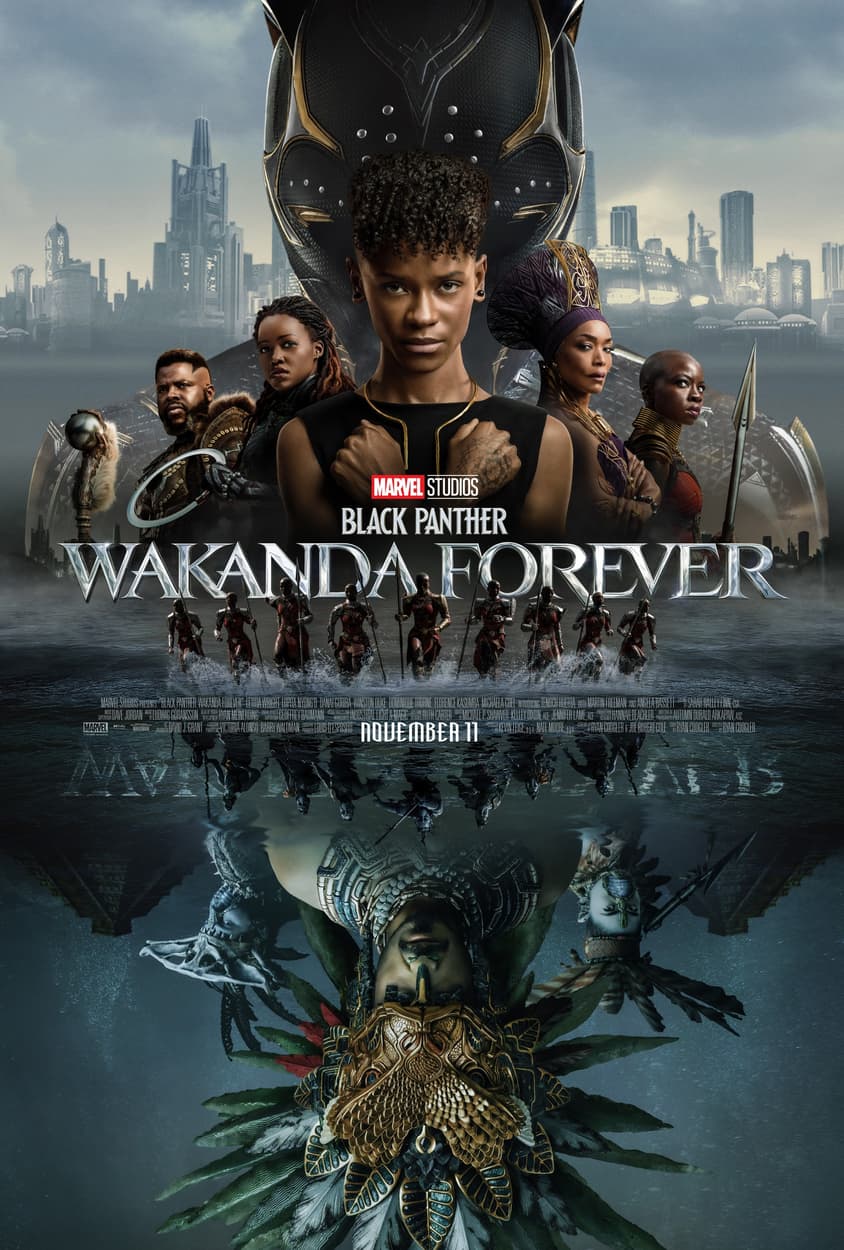
On the other hand, Baumann relayed a few of the challenges inherent to creating a realistic undersea environment. "I think, for me, the hardest part was just the amount of water overall," he shared. "Chris was underwater. Craig was above, primarily; some underwater pieces... I mean, Dan, would you say like 60% of our sets had a water feature, almost, in them? There was water all around, all the time."
"I mean, there was water everywhere," Sudick agreed. "If you think about just the dump tanks for the north triangle, there's a million gallons of water for one set."
"The overall challenge for all of us, I think, was just the amount of the water everywhere," Baumann reiterated. "And then Dan had the challenge, as he said, of two dump tanks that are like 500,000 gallons each, that fill up a swimming pool in 2 seconds. There's a lot of water moving. So there's a lot of technical aspects. Back to your build question, Dan's building some of the biggest water tanks that have ever been used, I think, in any film ever, with six-foot butterfly valves. So there's a physical aspect to that that's extremely challenging."
"And then you have Craig, who's now referencing how all of that water moves to create it in CG," he said. "What are the real dynamics of water? We have real reference, and that's kind of where the bridge between their worlds connect, where we're trying to get stuff in camera, but we get to see how real water moves, and that's kind of the challenge, then, from Craig and the ILM side, versus then Chris. He's all underwater. So then we had underwater tanks—20 foot-deep, 48 foot-diameter tanks that we shot in on stage. Then we excavated other tanks outside. So there was that challenge there, of acting in the physical aspects from a production side and then trying to get as much of those pieces to give us real content, if that makes sense: pixels on the screen at the end of the day."
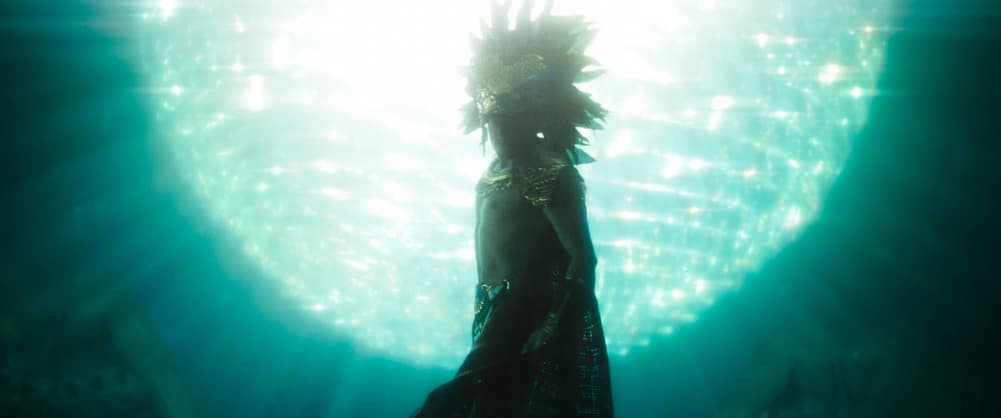
"So all of the effort that Dan put, regardless if it's above water or underwater, and then how [Director of Photography] Autumn [Durald Arkapaw] lit it and Hannah designed a set piece, that we preserve as many pixels to get those in the theater and then do our extensions that are embracing the realities of water—which I think that was then the challenge on Chris' side, that he hinted at, was just, 'How do we represent Ryan and Hannah's vision accurately to also feel underwater?'" he continued. "Because it can easily break, and you're creating a fantastical world, which is allowed—it's filmmaking; you can make whatever you want! You can have infinite visibility, if they wanted. But I think one thing that Chris and I really pushed for was trying to keep water real. Visibility falls off and colors are absorbed. So that was kind of that challenge for water."
"And then all the other sets had water features, which added a challenge production-wise and visual effects-wise to all the other partners that were working on it. And then just Dan's headache—our gaffer—every set had to then have different set ups from a rigging standpoint because water was there. So I think the water aspect of the feature was an extreme challenge production-wise, visual effects wise, on all fronts," he concluded.
"The thing that actually we spent the most time on probably was the marine snow, that little bit of stuff that's floating in the water," White revealed. "There was a lot of conversations about quality, density, and it is really the characteristic look. Then I remember, at one point, we did that one shot, Geoff. It was one that everyone liked, like, 'That's the look.' And it was just the perfect—the light on there! We said, 'This is the target shot.' But then we plugged those numbers into another shot and it didn't look anything like it. So it was like, on each shot, 'Okay, how do we get back to that look?' So it's like you said with water; you think you've nailed it, but then you just switch the camera angle or you do something slightly different and it's just like having to tame it all over again."
"With effects work, generally speaking, you can get something to look beautiful through a certain angle, and then—as Chris says—you change the camera angle and it looks totally different and you're now back in this," Baumann agreed. "So a lot of that work almost becomes one-off in shots. At least we know that Ryan in the studio likes something, so at least that's a target, but it's reworking. I think that was one of the big challenges, I'm sure, Craig, for you too: big wide shots of the city needed to be treated differently than something where we're putting white water on top of some of Dan's practical water. So there's so much work goes into it and it isn't just rinse and repeat. Each one ends up being its own challenge."
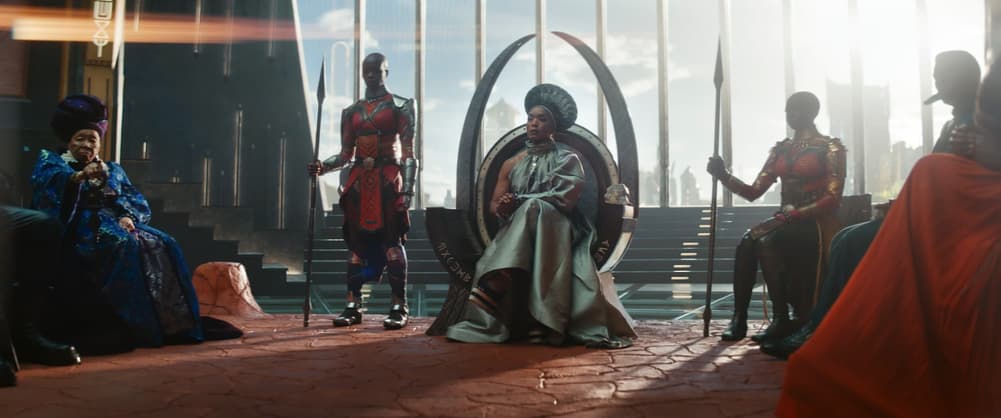
As for Namor's attack on the Wakandan throne room, Baumann outlined what the scene needed and how they made it a reality. "So there was initial conversation just conceptually with Ryan about Namor throwing hydro bombs at the window. We knew that then the glass would explode, and then there were conversations that we had that kind of trickled into post with regards to what's made out of Vibranium, what breaks and what doesn't break," he explained. "We did cheat some of those in there because, just impactfully, we needed the glass to break, but we wanted to keep some structure there of the window."
"And then, once we knew roughly what we wanted, previz stepped in and started to shot design what it could look like," he added. "Along with Autumn, our DP, she and Scott Meadows, our previz supervisor, worked together to design the shots along with Ryan. Then Dan, I think, kind of takes it from there and starts presenting different types of cannons or dump tanks to Ryan to determine what the look is. Then I think from there, Dan... If you maybe want to run with it from that point, once you understood how Ryan wanted the look, then you tested stuff in the parking lot."
"We took the previz," Sudick continued. "Once you have the previz dialed in to that specific point, you take the hydro bomb—it has to be a forceful impact. It couldn't be slow; it couldn't build and strain. So we eliminated dump tanks pretty early because of the time it takes for the water to get velocity. So we designed something that could be an explosion of water that would replicate the hydro bombs."
"We ended up building six very large water cannons and projecting nearly 15 tons of water through that window opening into the set. And at the same time, we plumbed the set with some plumbing so we could basically flood the set the instant the water from the windows came into the set, so we can wash her down into the glass," he said, then confirmed, "We had people in the shots."
"We had two stunts. I mean, Angela [Bassett] was in a little section," Baumann revealed. "There is a tight shot in that film where we were on her head, and I think, Craig, we augmented it a little bit, but for the most part, there was a lot of plate photography with Angela in that, but then there were stunt doubles in there as well."
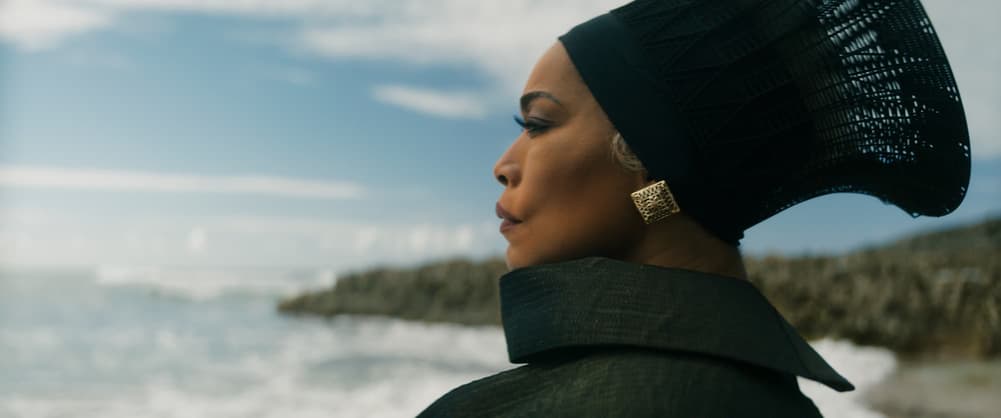
"We had Angela in there for the rig where we flooded the set instantly and washed her down in that hole," Sudick explained.
"But I think that that scene actually, also, we used miniatures to then build a third scale miniature glass window, because when we did the gag on set, we couldn't have the glass in, even with the stunt doubles and crew and whatnot," Baumann added. "So there was no glass in the windows on the set. But then we did a third-scale miniature that Dan hit with water that did have glass in it to try to marry those two pieces together. I mean, that whole scene actually is pretty phenomenal in the sense that then we did tank work as well with Angela—Queen Ramonda—drifting down. So that was another great example of a lot of complexity and lots of hand-offs between Dan and Craig's team as well."
"Yeah, it was a lot of stuff shot on set, but nothing really complete. We would shoot this piece, this piece, this piece, and they'd have to go somewhere and get assembled," Sudick said.
"And shot months apart, sometimes," Hammack pitched in. "There's a process that is really incredibly valuable, which is postviz, for a lot of this, which again goes back to Scott Meadows' team to do a rough assembly so that everyone knows, Ryan can have something in his edit, and we fine tune how much of what action we want to see and we need to deal with. That eventually gets, again, fine tuned and trimmed to just what we need to deal with in post."
"We can take that rough assembly and the footage pieces that have already been slugged in in a rough way and start to then pick it apart, as far as, 'This part's mostly successful. This part's completely successful. Timing-wise, they need to be adjusted, but...'" he continued. "I will say, there is so much tremendous power in what Dan was able to do that the scenes came together in postviz with the real footage in a way that you could immediately see what it needed to be."
Black Panther: Wakanda Forever is now streaming on Disney+.
Follow Black Panther on Twitter, Instagram, Facebook, and find Marvel now on TikTok!
The Daily Bugle
Can’t-miss news and updates from across the Marvel Universe!
